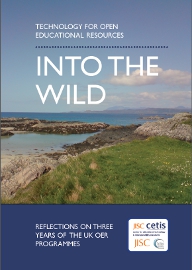Link: Implementation: Overview issues and experiences (PDF)
Link: LRMI Implementation: Overview issues and experiences (MS Word .docx)
Abstract
This paper presents a summary and synthesis of ten Learning Resource Metadata Initiative (LRMI) implementation projects funded by the Bill and Melinda Gates and William and Flora Hewlett Foundations between 2012 and 2013. Funding was allocated to ten OER platforms, through Creative Commons, as part of the Gates funded LRMI project. Cetis were commissioned by Creative Commons to produce cases studies on each project, and to undertake a synthesis of their experiences and outputs.
This synthesis outlines the methodology undertaken, before presenting a brief introduction to each OER platform along with an overview of platform functionality, scope, and technologies deployed. All ten platforms adopted different approaches to implementing LRMI, which are examined in the context of metadata creation and curation workflows. A summary of the implementation projects’ interaction with the Learning registry is also included together with the outlook for sustainable LRMI implementation.
Since its establishment in 2011, the Learning Resource Metadata Initiative (LRMI) has aimed to make it easier to publish, discover, and deliver quality educational resources on the web. From 2011 to 2014 the initiative was co-led by the Association of Educational Publishers (AEP) – the 501(c)(3) division of the Association of American Publishers, and Creative Commons, and funded in three phases by the Bill & Melinda Gates Foundation. In October 2014 the leadership and governance of LRMI passed to the Dublin Core Metadata Initiative, a long-established metadata community with expertise in metadata design, implementation and best practice.
Continue reading


